In Brief:
- You will find the best dissertation research areas / topics for future researchers enrolled in Engineering and technology.
- In order to identify the future research topics, we have reviewed the Engineering topics (recent peer-reviewed studies) on industrial automation.
- Industrial Automation is one of the important dissertation topics in the year 2020.
- Industrial Automation is the combination of instrumentation & control system and artificial intelligence.
- Industrial Automation mainly used in fields like robotics and control engineering.
After the era Britain industrial revolution, a large amount of effort has always been made to establish complicated strategies to support people with various production activities (Vasseur & Dunkels, 2010). An industrial manufacturing method comprises a sequence of devices by which a mixture of raw materials passes and becomes the final outcome (Mehta & Reddy, 2015). The word “machine” here could be any stuff such as, a conveyor belt, drill, motor,etc., that comes under electromechanical equipment or chemical devices such as chemical combustion systems, dryers, ovens, etc.
Industries and it is quite hard to envision a production section without automation devices(Ernst & Phillipson, 1987). Many aspects are contributing to automation system deployment in industrial production such as high-quality product specifications, high volume demand, high product reliability demands, etc.

Figure 1 Fourth Industrial Revolution: Industrial Automation
Industrial Automation
Industrial Automation is a method of running machinery as well as other industrial equipment using automated logical programs and with the aid of industrial equipment, eliminating human input in decision-making and physical control processes (Dongxu, Wei, Yun, Peijie, & Jiancheng, 2018; Vasseur & Dunkels, 2010). The description above is not an easy one to grasp; however, with the aid of a small instance, let us seek to understand what industrial automation is.
- X-ray Filmless Inspection Device
- Versatile manufacturing facilities
- Turnkey Swage Automated System
- Large production devices

Figure 2 Industrial Automation
Industrial Automation Process Hierarchy
Industrial automation structures could be very complicated in nature, having a large range of devices operating with automation technology in coordination. The industrial automation process hierarchy consists of three levels such as field level, Control Level and information or Enterprise level. The figure explains the hierarchical structure of the various hierarchical levels of the automation framework.
- Field Level
The lowest level of the hierarchy is the field level. Field level of automation that involves machines like actuators as well as sensors in the profession(S. Li, 2014). The principal function of such field equipment is to move process and system data to the next higher level for tracking and analyzing. And it also involves process variable control by actuators. For example, we may define this level as the arms and eyes of a given system.
- Control Level
This level comprises of different automation tools, such as PLCs, CNC machines, etc., that obtain system variables from different sensors(Frenzel, 2010). The automated controller’s control actuators dependent on the sensor signals transmitted and the software or control methodology used.
- Supervising and Production Control Level
- Programmable Logic Controllers (PLCs)
- Information or Enterprise Level
Enterprise Level is the industry automation top-level that controls the entire automation framework(Kim, 1992). The responsibilities of such a stage involve production planning, a study of consumer and demand, orders and sales, etc. So it is more about economic operations and less about the technological elements.
Industrial Automation Systems Types
- Fixed or Hard Automation
Fixed automation is used to conduct static and repeated processes to reach high production levels. It utilizes unique objective or devoted machinery to automate the assembly or handling operations of fixed sequences. When working, the product design is fairly difficult to modify or alter. It is also rigid in offering product range, but improves efficiency with a greater rate of production and lowers unit cost.
- Programmable Automation
Programmable automation is ideally applied to automated batch processing where the size of the material is medium to high. However, in this, the framework for new equipment or a series of activities is difficult to alter and reorganize. New platform or series of operations reconfigure thus needs a long installation. This automation system is exemplified by numerically controlled machines, steel rolling mills, paper mills, automotive robots, etc
- Flexible or Soft Automation
Flexible automation machine includes automatic control machinery which provides great flexibility to make product design adjustments. Such improvements can be achieved rapidly via the human operators ‘ instructions provided in the type of codes. Process automation helps producers to manufacture various products with different ranges, instead of as a single mix process. Some instances of such an automation system were automobiles, auto driven vehicles and CNC machines with multifunctional use.

Merits of Industrial Automation System
The Productivity Improved
Factory or process plant or manufacturing automation enhances production rate by good production control. It enables mass production by dramatically reducing installation time per product with a higher quality of production. Hence it creates a large amount of production for assigned labour input.
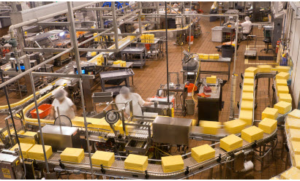
Figure 4 The Productivity Improved
Provides high operation costs
The incorporation of different methods with automated machinery in the industry reduces cycle times and energy, thereby reducing the necessity of human labour. Therefore automation has prevented the investment on workers.

Figure 5 High Operational Costs
The product quality enhancement
The automation removes human interference, it eliminates the risk of human errors. By dynamically regulating and tracking industrial processes at all phases right from the start of an item to a final product, coherence and quality of the product with higher compliance could be safeguarded with automation.
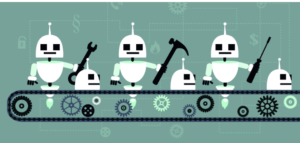
Figure 6 Product Quality Enhancement
Reduces routine inspections
The requirement for manual testing of different process variables is absolutely eliminated by automation. The industrial systems change system parameters automatically to fixed or requested values utilizing closed-loop control techniques by making use of automation innovations.
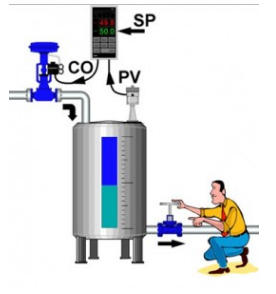
Figure 7 Reduces Routine Inspections
Raising safety standards
Industrial automation improves workers safety by replacing people with automated machines in dangerous working environments. Industrial robots, as well as robotic machines, are typically introduced in these perilous and risky places.
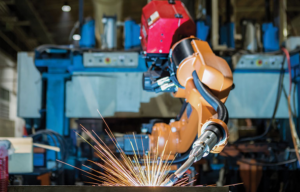
Figure 8 Raising Safety Standards
Demerits of Industrial Automation System
- People out of work. As most of the job is performed by machines, the need for manual labour is very minimal.
- Unable to automate all the required tasks using industrial automation technology. For instance, the manual installation, items with unusual sizes and shapes are usually left. Atomically precise manufacturing and algorithms seemed to change this trend.
- The initial outlay to incorporate an automation framework is extremely high.
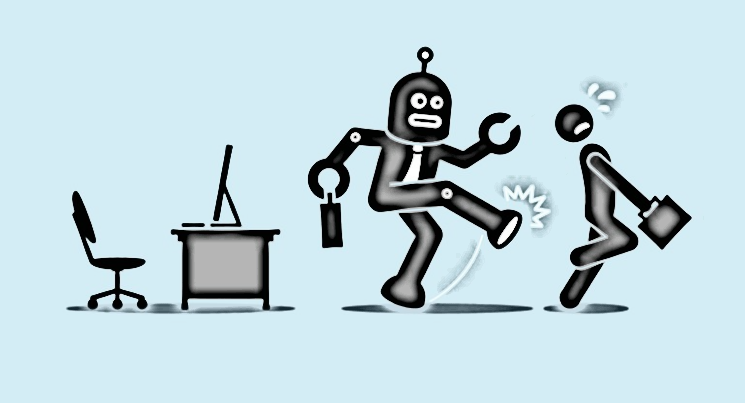
A group of qualifies skilled staff will always be needed for an operation as well as maintenance requirement.
Conclusion
Industrial Automation is one of the main research subjects in 2020. Industrial Automation is a fusion of the instrumentation & control system and artificial intelligence. It is utilized in the field of robotics and control engineering. Some of the benefits of industrial automation are enhancing efficiency, offering high cost of production, improving product quality and rising safety standards. Although it has myriads of positive points, it also has significant demerits as a loss of human employment.
Future Scope
- Blockchain for industrial automation IoT connected with 5 G(Mistry, Tanwar, Tyagi, & Kumar, 2020)
- Industrial automation used in Spanish industrial enterprises(Camiña, Díaz-Chao, & Torrent-Sellens, 2020)
- Intelligent recognition of faults for industrial automation framework(Pan, Chen, Xie, Chang, & Zhou, 2020)
- The transformation from determinant-driven urbanization to technology-driven urbanization, in Dongguan City, China(X. Li, Hui, Lang, Zheng, & Qin, 2020)
- Optimized automation assembly: Recognising technological productivity and employee satisfaction scheme criteria(Fletcher et al., 2020)
References
1. Camiña, E., Díaz-Chao, Á., & Torrent-Sellens, J. (2020). Automation technologies: Long-term effects for Spanish industrial firms. Technological Forecasting and Social Change, 151, 119828. https://doi.org/10.1016/j.techfore.2019.119828
2. Dongxu, Y., Wei, H., Yun, Z., Peijie, L., & Jiancheng, T. (2018). Virtual Private Cloud Based Power Dispatching Automation System – Architecture and Application. IEEE Transactions on Industrial Informatics, 1–1. https://doi.org/10.1109/TII.2018.2849005
3. Ernst, D., & Phillipson, B. (1987). Modern Developments in Industrial Automation. IFAC Proceedings Volumes, 20(5), 1–8. https://doi.org/10.1016/S1474-6670(17)55532-9
4. Fletcher, S. R., Johnson, T., Adlon, T., Larreina, J., Casla, P., Parigot, L., … Otero, M. del M. (2020). Adaptive automation assembly: Identifying system requirements for technical efficiency and worker satisfaction. Computers & Industrial Engineering, 139, 105772. https://doi.org/10.1016/j.cie.2019.03.036
5. Frenzel, L. E. (2010). Industrial Control. In Electronics Explained (pp. 277–308). https://doi.org/10.1016/B978-1-85617-700-9.00012-6
6. Kim, S. H. (1992). A Unified Architecture For Design And Manufacturing Integration. In Artificial Intelligence in Engineering Design (pp. 255–280). https://doi.org/10.1016/B978-0-08-092602-5.50017-2
7. Li, S. (2014). The latest design technologies for gear devices with great transmission ratios. In International Gear Conference 2014: 26th–28th August 2014, Lyon (pp. 427–436). https://doi.org/10.1533/9781782421955.427
8. Li, X., Hui, E. C., Lang, W., Zheng, S., & Qin, X. (2020). Transition from factor-driven to innovation-driven urbanization in China: A study of manufacturing industry automation in Dongguan City. China Economic Review, 59, 101382. https://doi.org/10.1016/j.chieco.2019.101382
9. Mehta, B. R., & Reddy, Y. J. (2015). Industrial Process Automation Systems. https://doi.org/10.1016/C2013-0-18954-4
10. Mistry, I., Tanwar, S., Tyagi, S., & Kumar, N. (2020). Blockchain for 5G-enabled IoT for industrial automation: A systematic review, solutions, and challenges. Mechanical Systems and Signal Processing, 135, 106382. https://doi.org/10.1016/j.ymssp.2019.106382
11. Pan, T., Chen, J., Xie, J., Chang, Y., & Zhou, Z. (2020). Intelligent fault identification for industrial automation system via multi-scale convolutional generative adversarial network with partially labeled samples. ISA Transactions. https://doi.org/10.1016/j.isatra.2020.01.014
12. Vasseur, J.-P., & Dunkels, A. (2010). Industrial Automation. In Interconnecting Smart Objects with IP (pp. 325–333). https://doi.org/10.1016/B978-0-12-375165-2.00021-1
- Step by Step Guide to Writing a Professional PhD. Dissertation - February 3, 2021
- What are a big data analytics and how it is being used? Mention the benefits of big data analytics - November 13, 2020
- How to solve some of the difficulties in thesis proposal writing through interaction with their peers in the writing course - October 29, 2020

